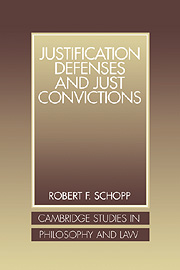Book contents
- Frontmatter
- Contents
- Preface
- Frequently Cited Sources
- Dedication
- 1 Justification Defenses: The Issues
- 2 Justification Defenses and the Conventional Public Morality
- 3 Self-defense
- 4 Self-defense and Battered Women
- 5 Duress and Systemically Complete Mitigation
- 6 The Limits of Justification: Necessity and Nullification
- 7 Conclusions
- Index
2 - Justification Defenses and the Conventional Public Morality
Published online by Cambridge University Press: 29 October 2009
- Frontmatter
- Contents
- Preface
- Frequently Cited Sources
- Dedication
- 1 Justification Defenses: The Issues
- 2 Justification Defenses and the Conventional Public Morality
- 3 Self-defense
- 4 Self-defense and Battered Women
- 5 Duress and Systemically Complete Mitigation
- 6 The Limits of Justification: Necessity and Nullification
- 7 Conclusions
- Index
Summary
This chapter examines the central theoretical issues and difficult cases raised in Section 1.1 regarding the general category of justification defenses. It advances a theoretical framework that accommodates these difficult cases and clarifies the parameters of this category of defense, and it provides a foundation for this class of defenses in the broader structure of criminal offenses and defenses and in the moral condemnation inherent in criminal punishment. As part of the process of articulating a theory of justification defenses, this chapter begins to explore the boundaries that separate justifications from related legal categories, including excuse and mitigation. It does not attempt to develop a comprehensive theory of criminal defenses, however, as it addresses these related issues only insofar as doing so advances the primary purpose of articulating the contours of justification defenses.
Right or Permissible
Several arguments support the contention that justified conduct is right rather than merely permissible. Justified cannot mean merely not liable to punishment because excused conduct is not punishable, yet it is not justified. As an ideal guide for individual conduct, the law should provide a right answer for each situation. If justified conduct is objectively right, the actor has a right to do it, and, thus, others have a duty not to interfere. This formulation promotes the purpose of law by avoiding mutually justified violent conflicts. If justified conduct were merely permissible, however, two or more permissible alternatives might conflict, leading to incompatible justifications.
- Type
- Chapter
- Information
- Justification Defenses and Just Convictions , pp. 16 - 54Publisher: Cambridge University PressPrint publication year: 1998



